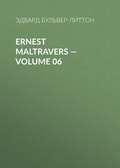
Эдвард Бульвер-Литтон
Paul Clifford — Volume 03
"Was it not? Whenever the gastronomists set up a religious inquisition, I trust they will roast every impious rascal who treats the divine mystery with levity. Pun upon cooking, indeed! A propos of Dareville, he is to come into the administration."
"You astonish me!" said Brandon. "I never heard that; I don't know him.
He has very little power; has he any talent?"
"Yes, a very great one,—acquired, though."
"What is it?"
"A pretty wife!"
"My lord!" exclaimed Brandon, abruptly, and half rising from his seat.
Mauleverer looked up hastily, and on seeing the expression of his companion's face coloured deeply; there was a silence for some moments.
"Tell me," said Brandon, indifferently, helping himself to vegetables, for he seldom touched meat; and a more amusing contrast can scarcely be conceived than that between the earnest epicurism of Mauleverer and the careless contempt of the sublime art manifested by his guest,—"tell me, you who necessarily know everything, whether the government really is settled,—whether you are to have the garter, and I (mark the difference!) the judgeship."
"Why so, I imagine, it will be arranged; namely, if you will consent to hang up the rogues instead of living by the fools!"
"One may unite both!" returned Brandon. "But I believe, in general, it is vice versa; for we live by the rogues, and it is only the fools we are able to hang up. You ask me if I will take the judgeship. I would not— no, I would rather cut my hand off," and the lawyer spoke with great bitterness, "forsake my present career, despite all the obstacles that now encumber it, did I think that this miserable body would suffer me for two years longer to pursue it."
"You shock me!" said Mauleverer, a little affected, but nevertheless applying the cayenne to his cucumber with his usual unerring nicety of tact,—"you shock me; but you are considerably better than you were."
"It is not," continued Brandon, who was rather speaking to himself than to his friend,—"it is not that I am unable to conquer the pain and to master the recreant nerves; but I feel myself growing weaker and weaker beneath the continual exertion of my remaining powers, and I shall die before I have gained half my objects, if I do not leave the labours which are literally tearing me to pieces."
"But," said Lord Mauleverer, who was the idlest of men, "the judgeship is not an easy sinecure."
"No; but there is less demand on the mind in that station than in my present one;" and Brandon paused before he continued. "Candidly, Mauleverer, you do not think they will deceive me,—you do not think they mean to leave me to this political death without writing 'Resurgam' over the hatchment?"
"They dare not!" said Mauleverer, quaffing his fourth glass of madeira.
"Well, I have decided on my change of life," said the lawyer, with a slight sigh.
"So have I on my change of opinion," chimed in the earl. "I will tell you what opinions seem to me like."
"What?" said Brandon, abstractedly.
"Trees!" answered Mauleverer, quaintly. "If they can be made serviceable by standing, don't part with a stick; but when they are of that growth that sells well, or whenever they shut out a fine prospect, cut them down, and pack them off by all manner of means!—And now for the second course."
"I wonder," said the earl, when our political worthies were again alone, "whether there ever existed a minister who cared three straws for the people; many care for their party, but as for the country—"
"It is all fiddlestick!" added the lawyer, with more significance than grace.
"Right; it is all fiddlestick, as you tersely express it. King, Constitution, and Church, forever! which, being interpreted, means, first, King or Crown influence, judgeships, and garters; secondly, Constitution, or fees to the lawyer, places to the statesman, laws for the rich, and Game Laws for the poor; thirdly, Church, or livings for our younger sons, and starvings for their curates!"
"Ha, ha!" said Brandon, laughing sardonically; "we know human nature!"
"And how it may be gulled!" quoth the courtier. "Here's a health to your niece; and may it not be long before you hail her as your friend's bride!"
"Bride, et cetera," said Brandon, with a sneer meant only for his own satisfaction. "But mark me, my dear lord, do not be too sure of her. She is a singular girl, and of more independence than the generality of women. She will not think of your rank and station in estimating you; she will think only of their owner; and pardon me if I suggest to you, who know the sex so well, one plan that it may not be unadvisable for you to pursue. Don't let her fancy you entirely hers; rouse her jealousy, pique her pride, let her think you unconquerable, and unless she is unlike all women, she will want to conquer you."
The earl smiled. "I must take my chance!" said he, with a confident tone.
"The hoary coxcomb!" muttered Brandon, between his teeth; "now will his folly spoil all."
"And that reminds me," continued Mauleverer, "that time wanes, and dinner is not over; let us not hurry, but let us be silent, to enjoy the more. These truffles in champagne,—do taste them; they would raise the dead."
The lawyer smiled, and accepted the kindness, though he left the delicacy untouched; and Mauleverer, whose soul was in his plate, saw not the heartless rejection.
Meanwhile the youthful beauty had already entered the theatre of pleasure, and was now seated with the squire at the upper end of the half-filled ball-room.
A gay lady of the fashion at that time, and of that half and half rank to which belonged the aristocracy of Bath,—one of those curious persons we meet with in the admirable novels of Miss Burney, as appertaining to the order of fine ladies,—made the trio with our heiress and her father, and pointed out to them by name the various characters that entered the apartments. She was still in the full tide of scandal, when an unusual sensation was visible in the environs of the door; three strangers of marked mien, gay dress, and an air which, though differing in each, was in all alike remarkable for a sort of "dashing" assurance, made their entree. One was of uncommon height, and possessed of an exceedingly fine head of hair; another was of a more quiet and unpretending aspect, but nevertheless he wore upon his face a supercilious yet not ill- humoured expression; the third was many years younger than his companions, strikingly handsome in face and figure, altogether of a better taste in dress, and possessing a manner that, though it had equal ease, was not equally noticeable for impudence and swagger.
"Who can those be?" said Lucy's female friend, in a wondering tone. "I never saw them before,—they must be great people,—they have all the airs of persons of quality! Dear, how odd that I should not know them!"
While the good lady, who, like all good ladies of that stamp, thought people of quality had airs, was thus lamenting her ignorance of the new-comers, a general whisper of a similar import was already circulating round the room, "Who are they?" and the universal answer was, "Can't tell,—never saw them before!"
Our strangers seemed by no means displeased with the evident and immediate impression they had made. They stood in the most conspicuous part of the room, enjoying among themselves a low conversation, frequently broken by fits of laughter,—tokens, we need not add, of their supereminently good breeding. The handsome figure of the youngest stranger, and the simple and seemingly unconscious grace of his attitudes were not, however, unworthy of the admiration he excited; and even his laughter, rude as it really was, displayed so dazzling a set of teeth, and was accompanied by such brilliant eyes, that before he had been ten minutes in the room there was scarcely a young lady under thirty-nine not disposed to fall in love with him.
Apparently heedless of the various remarks which reached their ears, our strangers, after they had from their station sufficiently surveyed the beauties of the ball, strolled arm-in-arm through the rooms. Having sauntered through the ball and card rooms, they passed the door that led to the entrance passage, and gazed, with other loiterers, upon the new-comers ascending the stairs. Here the two younger strangers renewed their whispered conversation, while the eldest, who was also the tallest one, carelessly leaning against the wall, employed himself for a few moments in thrusting his fingers through his hair. In finishing this occupation, the peculiar state of his rules forced itself upon the observation of our gentleman, who, after gazing for some moments on an envious rent in the right ruffle, muttered some indistinct words, like "the cock of that confounded pistol," and then tucked up the mutilated ornament with a peculiarly nimble motion of the fingers of his left hand; the next moment, diverted by a new care, the stranger applied his digital members to the arranging and caressing of a remarkably splendid brooch, set in the bosom of a shirt the rude texture of which formed a singular contrast with the magnificence of the embellishment and the fineness of the one ruffle suffered by our modern Hyperion to make its appearance beneath his cinnamon-coloured coatsleeve. These little personal arrangements completed, and a dazzling snuff-box released from the confinement of a side-pocket, tapped thrice, and lightened of two pinches of its titillating luxury, the stranger now, with the guardian eye of friendship, directed a searching glance to the dress of his friends. There all appeared meet for his strictest scrutiny, save, indeed, that the supercilious-looking stranger having just drawn forth his gloves, the lining of his coat-pocket which was rather soiled into the bargain—had not returned to its internal station; the tall stranger, seeing this little inelegance, kindly thrust three fingers with a sudden and light dive into his friend's pocket, and effectually repulsed the forwardness of the intrusive lining. The supercilious stranger no sooner felt the touch than he started back, and whispered to his officious companion,—
"What! among friends, Ned! Fie now; curb the nature of thee for one night at least."
Before he of the flowing locks had time to answer, the master of the ceremonies, who had for the last three minutes been eying the strangers through his glass, stepped forward with a sliding bow; and the handsome gentleman, taking upon himself the superiority and precedence over his comrades, was the first to return the courtesy. He did this with so good a grace and so pleasing an expression of countenance that the censor of bows was charmed at once, and with a second and more profound salutation announced himself and his office. "You would like to dance probably, gentlemen?" he asked, glancing at each, but directing his words to the one who had prepossessed him.
"You are very good," said the comely stranger; "and, for my part, I shall be extremely indebted to you for the exercise of your powers in my behalf. Allow me to return with you to the ball-room, and I can there point out to you the objects of my especial admiration."
The master of the ceremonies bowed as before, and he and his new acquaintance strolled into the ball-room, followed by the two comrades of the latter.
"Have you been long in Bath, sir?" inquired the monarch of the rooms.
"No, indeed! we only arrived this evening."
"From London?"
"No; we made a little tour across the country."
"Ah! very pleasant, this fine weather."
"Yes; especially in the evenings."
"Oho! romantic!" thought the man of balls, as he rejoined aloud, "Why, the nights are agreeable, and the moon is particularly favourable to us."
"Not always!" quoth the stranger.
"True, true, the night before last was dark; but, in general, surely the moon has been very bright."
The stranger was about to answer, but checked himself, and simply bowed his head as in assent.
"I wonder who they are!" thought the master of the ceremonies. "Pray, sir," said he, in a low tone, "is that gentle man, that tall gentleman, any way related to Lord —————? I cannot but think I see a family likeness."
"Not in the least related to his lordship," answered the stranger; "but he is of a family that have made a noise in the world; though he, as well as my other friend, is merely a commoner!" laying a stress on the last word.
"Nothing, sir, can be more respectable than a commoner of family," returned the polite Mr. ———-, with a bow.
"I agree with you, sir," answered the stranger, with another. "But, heavens!"—and the stranger started; for at that moment his eye caught for the first time, at the far end of the room, the youthful and brilliant countenance of Lucy Brandon,—"do I see rightly, or is that Miss Brandon?"
"It is indeed that lovely young lady," said Mr. ———-. "I congratulate you on knowing one so admired. I suppose that you, being blessed with her acquaintance, do not need the formality of my introduction?"
"Umph!" said the stranger, rather shortly and uncourteously. "No! Perhaps you had better present me!"
"By what name shall I have that honour, sir?" discreetly inquired the nomenclator.
"Clifford!" answered the stranger; "Captain Clifford!" Upon this the prim master of the ceremonies, threading his path through the now fast- filling room, approached towards Lucy to obey Mr. Clifford's request. Meanwhile that gentleman, before he followed the steps of the tutelary spirit of the place, paused and said to his friends, in a tone careless yet not without command, "Hark ye, gentlemen; oblige me by being as civil and silent as ye are able; and don't thrust yourselves upon me, as you are accustomed to do, whenever you see no opportunity of indulging me with that honour with the least show of propriety!" So saying, and waiting no reply, Mr. Clifford hastened after the master of the ceremonies.
"Our friend grows mighty imperious!" said Long Ned, whom our readers have already recognized in the tall stranger.
"'T is the way with your rising geniuses," answered the moralizing Augustus Tomlinson. "Suppose we go to the cardroom and get up a rubber!"
"Well thought of," said Ned, yawning,—a thing he was very apt to do in society; "and I wish nothing worse to those who try our rubbers than that they may be well cleaned by them." Upon this witticism the Colossus of Roads, glancing towards the glass, strutted off, arm-in-arm with his companion, to the card-room.
During this short conversation the re-introduction of Mr. Clifford (the stranger of the Rectory and deliverer of Dr. Slopperton) to Lucy Brandon had been effected, and the hand of the heiress was already engaged, according to the custom of that time, for the two ensuing dances.
It was about twenty minutes after the above presentation had taken place that Lord Mauleverer and William Brandon entered the rooms; and the buzz created by the appearance of the noted peer and the distinguished lawyer had scarcely subsided, before the royal personage expected to grace the "festive scene" (as the newspapers say of a great room with plenty of miserable-looking people in it) arrived. The most attractive persons in Europe may be found among the royal family of England, and the great personage then at Bath, in consequence of certain political intrigues, wished, at that time especially, to make himself as popular as possible. Having gone the round of the old ladies, and assured them, as the "Court Journal" assures the old ladies at this day, that they were "morning stars" and "swan-like wonders," the prince espied Brandon, and immediately beckoned to him with a familiar gesture. The smooth but saturnine lawyer approached the royal presence with the manner that peculiarly distinguished him, and which blended in no ungraceful mixture a species of stiffness that passed with the crowd for native independence, with a supple insinuation that was usually deemed the token of latent benevolence of heart. There was something, indeed, in Brandon's address that always pleased the great; and they liked him the better because, though he stood on no idle political points, mere differences in the view taken of a hairbreadth,—such as a corn-law or a Catholic bill, alteration in the Church or a reform in parliament,—yet he invariably talked so like a man of honour (except when with Mauleverer) that his urbanity seemed attachment to individuals, and his concessions to power sacrifices of private opinion for the sake of obliging his friends.
"I am very glad indeed," said the royal personage, "to see Mr. Brandon looking so much better. Never was the crown in greater want of his services; and if rumour speak true, they will soon be required in another department of his profession."
Brandon bowed, and answered,—
"So please your royal highness, they will always be at the command of a king from whore I have experienced such kindness, in any capacity for which his Majesty may deem them fitting."
"It is true, then!" said his royal highness, significantly. "I congratulate you! The quiet dignity of the bench must seem to you a great change after a career so busy and restless."
"I fear I shall feel it so at first, your royal highness," answered Brandon, "for I like even the toil of my profession; and at this moment, when I am in full practice, it more than ever—But" (checking himself at once) "his Majesty's wishes, and my satisfaction in complying with them, are more than sufficient to remove any momentary regret I might otherwise have felt in quitting those toils which have now become to me a second nature."
"It is possible," rejoined the prince, "that his Majesty took into consideration the delicate state of health which, in common with the whole public, I grieve to see the papers have attributed to one of the most distinguished ornaments of the bar."
"So please your royal highness," answered Brandon, coolly, and with a smile which the most piercing eye could not have believed the mask to the agony then gnawing at his nerves, "it is the interest of my rivals to exaggerate the little ailments of a weak constitution. I thank Providence that I am now entirely recovered; and at no time of my life have I been less unable to discharge—so far as my native and mental, incapacities will allow—the duties of any occupation, however arduous. Nay, as the brute grows accustomed to the mill, so have I grown wedded to business; and even the brief relaxation I have now allowed myself seems to me rather irksome than pleasurable."
"I rejoice to hear you speak thus," answered his royal highness, warmly; "and I trust for many years, and," added he, in a lower tone, "in the highest chamber of the senate, that we may profit by your talents. The times are those in which many occasions occur that oblige all true friends of the Constitution to quit minor employment for that great constitutional one that concerns us all, the highest and the meanest; and" (the royal voice sank still lower) "I feel justified in assuring you that the office of chief-justice alone is not considered by his Majesty as a sufficient reward for your generous sacrifice of present ambition to the difficulties of government."
Brandon's proud heart swelled, and that moment the veriest pains of hell would scarcely have been felt.
While the aspiring schemer was thus agreeably engaged, Mauleverer, sliding through the crowd with that grace which charmed every one, old and young, and addressing to all he knew some lively or affectionate remark, made his way to the dancers, among whom he had just caught a glimpse of Lucy. "I wonder," he thought, "whom she is dancing with. I hope it is that ridiculous fellow, Mossop, who tells a good story against himself; or that handsome ass, Belmont, who looks at his own legs, instead of seeming to have eyes for no one but his partner. Ah! if Tarquin had but known women as well as I do, he would have had no reason to be rough with Lucretia. 'T is a thousand pities that experience comes, in women as in the world, just when it begins to be no longer of use to us!"
As he made these moral reflections, Mauleverer gained the dancers, and beheld Lucy listening, with downcast eyes and cheeks that evidently blushed, to a young man whom Mauleverer acknowledged at once to be one of the best-looking fellows he had ever seen. The stranger's countenance, despite an extreme darkness of complexion, was, to be sure, from the great regularity of the features, rather effeminate; but, on the other hand, his figure, though slender and graceful, betrayed to an experienced eye an extraordinary proportion of sinew and muscle; and even the dash of effeminacy in the countenance was accompanied by so manly and frank an air, and was so perfectly free from all coxcombry or self-conceit, that it did not in the least decrease the prepossessing effect of his appearance. An angry and bitter pang shot across that portion of Mauleverer's frame which the earl thought fit, for want of another name, to call his heart. "How cursedly pleased she looks!" muttered he. "By Heaven! that stolen glance under the left eyelid, dropped as suddenly as it is raised; and he—ha! how firmly he holds that little hand! I think I see him paddle with it; and then the dog's earnest, intent look,—and she all blushes, though she dare not look up to meet his gaze, feeling it by intuition. Oh, the demure, modest, shamefaced hypocrite! How silent she is! She can prate enough to me! I would give my promised garter if she would but talk to him. Talk, talk, laugh, prattle, only simper, in God's name, and I shall be happy. But that bashful, blushing silence,— it is insupportable. Thank Heaven, the dance is over! Thank Heaven, again! I have not felt such pains since the last nightmare I had after dining with her father!"







